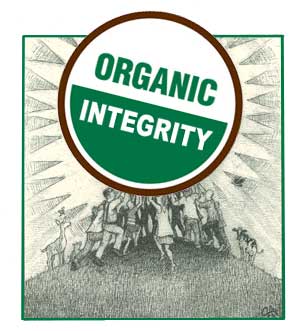13
Apr
Still Time to be Heard on Organic Integrity; Comments Due Tomorrow, April 14!
(Beyond Pesticides, April 13, 2016) The organic regulatory process provides numerous opportunities for the public to weigh in on what is allowable in organic production. The spring 2016 public comment period is coming to a close for the National Organic Standards Board’s (NOSB) proposed recommendations on organic standards, materials and policy. Comments are due by tomorrow, April 14, 2016 at 11:59 PM. There are many important issues that are under NOSB consideration. Your voice is integral to maintaining organic integrity and the value of the USDA organic label. Remember, the Secretary of Agriculture may not allow materials in organic production that are not first recommended by the NOSB.
 On our Public Comment Alerts page, we have listed our positions on some of our top priority issues, such as inert ingredients, sanitizers, ancillary substances, carrageenan, and paraciticides. We have now updated our Keeping Organic Strong (KOS) page with the rest of our top priority issues (as of April 12, 2016), and included the newest ones below. Please feel free to develop your own comments or cut and paste from our sample comments below or our final comments on the above KOS page:
On our Public Comment Alerts page, we have listed our positions on some of our top priority issues, such as inert ingredients, sanitizers, ancillary substances, carrageenan, and paraciticides. We have now updated our Keeping Organic Strong (KOS) page with the rest of our top priority issues (as of April 12, 2016), and included the newest ones below. Please feel free to develop your own comments or cut and paste from our sample comments below or our final comments on the above KOS page:
Policy and Procedures Manual Revisions
“I appreciate the response to fall comments regarding the difficulty of reviewing proposed changes to the Policy and Procedures Manual (PPM). I appreciate, in particular, the clarification that the NOSB will vote on the proposed changes and the publication of a redlined version and an annotated table of contents. I do not think it is appropriate, however, for the NOSB to consider such a complicated proposal without an explanation and justification of each change. In giving legal status to the word “organic,” to maintain accountability to organic stakeholders, and to keep government intrusion in check, Congress explicitly empowered the NOSB to counter an abuse of government authority in an organic sector that daily challenges basic tenets of chemical-intensive and genetically engineered agriculture, which has deep institutional roots within USDA. The PPM is the instrument through which the NOSB maintains its ability to set the standards for organic production in the United States. The NOSB must not relinquish that authority and responsibility by weakening the PPM.”
Nutrient vitamins and minerals
“I appreciate the efforts of the Handling Subcommittee in untangling the mess that has come from mistaken implementation of past NOSB recommendations. Added vitamins and minerals —synthetic or nonsynthetic””should not be permitted in products labeled “organic” unless required by law. Consumers expect that organic food contains a complete complement of nutrients based on organic agricultural production practices, not supplementation.”
See our Public Comment Alerts page for a complete list of our top priority issues and sample comments. One of the best ways to make your voice heard is to submit your comments to regulations.gov. You can search for the meeting using this docket number: AMS-NOP-15-0085 or by clicking the link. If you cut and paste our comments into regulations.gov for the top priority issues before the NOSB, please first put a personal note of concern in order to reflect the importance if these issues to you, and to make sure your comment is read by an NOSB member.
We have also finished analyzing the other numerous recommendations and have provided you with our positions, which we hope you will use as the basis for your comments. See our final comments and learn about all of the issues at the spring 2016 NOSB meeting by clicking here.
NOSB Meeting Details:
Monday, April 25, 2016 – 8:30am to Wednesday, April 27, 2016 – 5:00pm
Omni Shoreham Hotel, 2500 Calvert Street, NW, Washington, DC 20008
If you plan on attending the meeting and want to provide oral comments, you must reserve an oral comment slot. Oral public comments are scheduled in two blocks:
- Tuesday, April 19, 2016, 1:00pm-4:00pm ET via webinar; 4 minute comment slot
- Monday/Tuesday, April 25 and 26, during the face-to-face meeting; 3 minute comment slot
Oral commenters may only sign up for one comment slot, and the sign-up deadline is tomorrow, April 14, 2016 at 11:59pm. Again, you can reserve an oral comment slot by clicking here.
We ask that you submit comments on as many issues and materials as you can by 11:59pm, April 14, 2016 deadline. For help crafting your comments, view Beyond Pesticides’ commenting guide. For all other questions, please go to Beyond Pesticides’ Keeping Organic Strong webpage to learn more about these and other substantive issues and provide a unique public comment.
Thank you for standing up to keep organic strong!
All unattributed positions and opinions in this piece are those of Beyond Pesticides.










